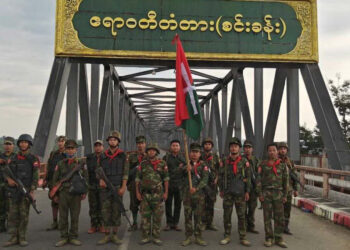YANGON — A military appointed lawmaker swore at and threatened to assault journalists who were taking photographs and videotaping in the Parliament building in Naypyitaw on Wednesday, drawing condemnation from the media and demands for an explanation from the military.
Before the Union Parliament session began, Major-General Tin Swe Win threatened a photojournalist from the European Press Agency in front of the Parliament building, telling him not to take his photo or post anything about him online, adding that if the reporter did so the officer would punch him.
On the same day, after the session, he swore at a journalist from Mizzima Media, using obscene language. Video evidence of his outburst appeared in the media, along with reports on the military’s budget requests to the Union Parliament for the coming fiscal year.
Maj-Gen. Tin Swe Win has a master’s degree in defense studies from the Defense Services Academy in Pyin Oo Lwin. He served on the auxiliary force in the Naypyitaw Command before taking an appointed seat in the Parliament, according to the Parliament’s official record.
“He has to be sensible. He should not talk that way in the Parliament,” said U Sein Win,
training director at the Myanmar Journalism Institute.
U Sein Win told The Irrawaddy, “This is not the front line [of the battlefield]. This is the Parliament. He must behave himself.”
Under the National League for Democracy-led government, restrictions have been placed on the way media covers Parliament. However, the journalists threatened by the officer were acting within those rules, covering the Union Parliament session from within in the designated areas.
“The media are doing their job. We aren’t breaking any rules. Media organizations should send a complaint letter to the military,” said U Sein Win.
“His manner shows he doesn’t respect our job. It is unacceptable,” he added.
In 2016, the Union Parliament Office released an 18-point set of guidelines for the media, restricting each organization to a maximum of five journalists to cover parliamentary affairs and interview lawmakers in the designated spaces. It prohibits filming and photography in certain buildings and areas without permission.
Under the previous government, journalists were also banned from an observation booth above the Union Parliament chamber and sessions of both the Upper and Lower houses. Parliament reporters were forced to watch the sessions on a TV screen in a corridor. Media members said that the restrictions came after journalists took photos and videos of lawmakers sleeping during sessions, and in one case of a military lawmaker voting on behalf of his absent neighbor.
Members of the press said the military lawmaker’s manner shows how hard it will be for the Tatmadaw to salvage its reputation among a press corps with which it already has deep-rooted tensions due to past incidents, despite military commander-in-chief Senior-General Min Aung Hlaing’s order to military personnel to have good relations with the media.
The military has treated the media in the same way for many years, communicating with journalists only when they need to get a point across, said U Nyan Hlaing Lynn, chief editor at Hintha Media.
A journalist at Mizzima, Ko Min Min, said he feels it was unacceptable that the military lawmaker could launch a verbal assault unprovoked, and said he was considering sending a letter to military lawmakers and the parliamentary rights committee.
There was speculation in the media yesterday that Wednesday’s incident involving Maj-Gen. Tin Swe Win and reporters would lead to the reimposition of old restrictions. Most media members demanded an explanation from the military regarding his manner.
“In his position, it is not suitable to mistreat others in the Parliament, not even the media. Military officials should investigate the case and explain why it happened,” said U Myint Kyaw, a member of the Press Council.
U Myint Kyaw said, “We have to wait and see how the Tatmadaw [Myanmar’s military] will respond.”
Irrawaddy reporters Zue Zue and Htet Naing Zaw contributed to this report.

















